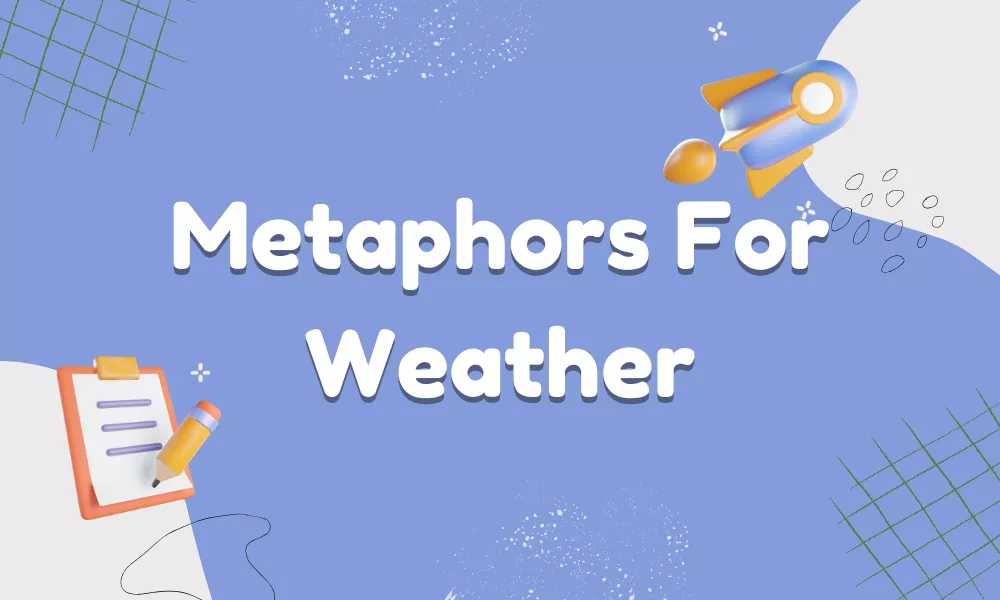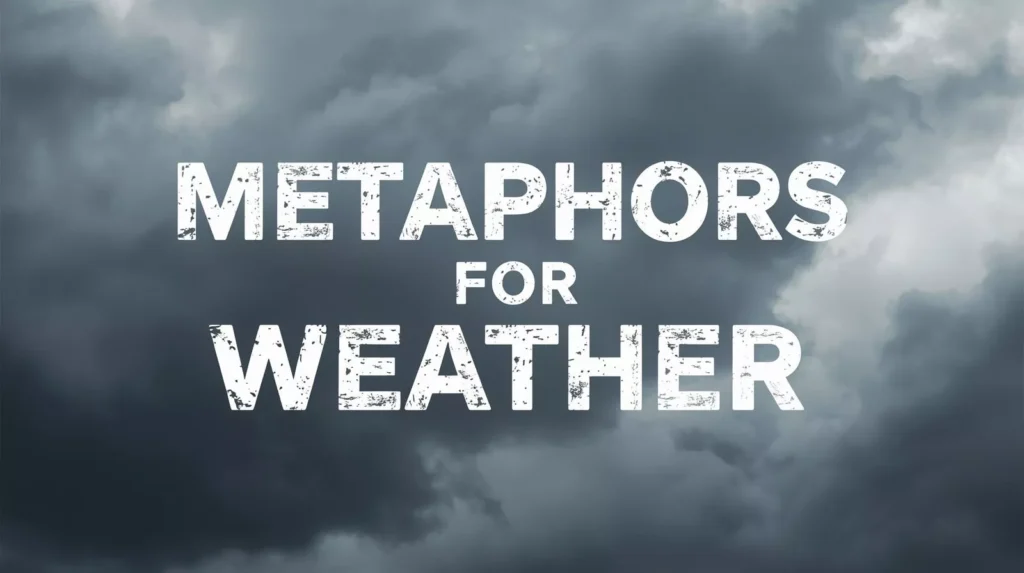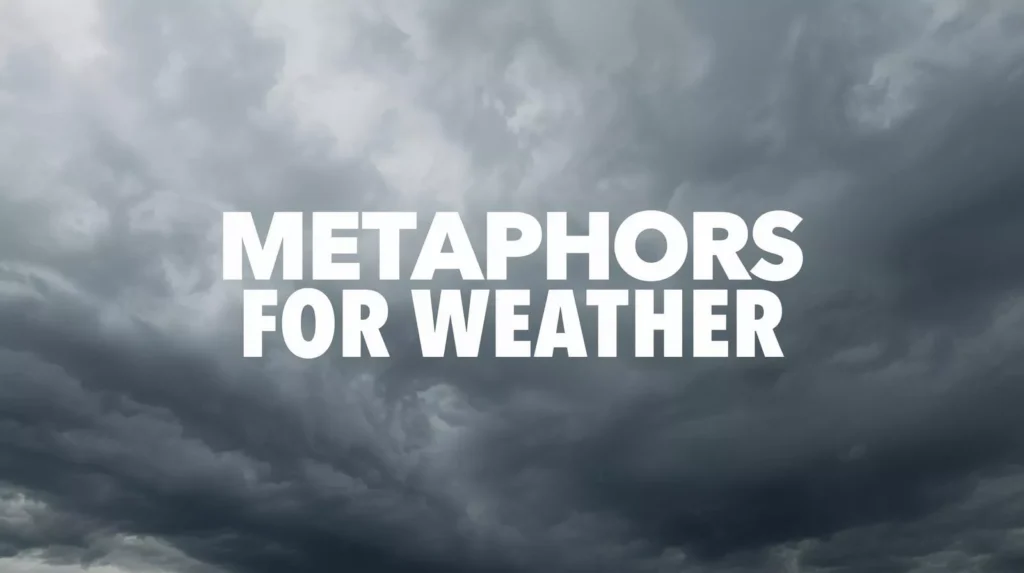Metaphors for Weather – Express Emotions Through Nature’s Language

Weather is more than just sunshine, rain, or clouds but it’s a mirror of our emotions and experiences. Just as the skies shift from calm to stormy, our moods and moments change too. Metaphors for weather beautifully capture these feelings, transforming ordinary descriptions into vivid imagery. When we say “the sky weeps” or “the sun smiles,” we’re not just talking about the weather, we’re expressing emotion, atmosphere, and story.
What Are Metaphors for Weather?
Metaphors for weather are creative comparisons that describe weather conditions by linking them to human emotions, behaviors, or familiar experiences. Instead of saying “it’s raining heavily,” someone might say “the sky is crying,” turning a simple statement into something more expressive and emotional. These metaphors help us paint vivid pictures with words, making descriptions of the weather feel alive and meaningful. They also reflect how closely the weather is tied to our moods and stories.

Everyday Metaphors for Weather
- The sky is crying
Meaning: Represents rain or sadness.
Example: The sky was crying as she said goodbye. - The sun smiled down
Meaning: Describes a bright and cheerful sunny day.
Example: The sun smiled down on the happy couple at their wedding. - The clouds are a blanket
Meaning: Suggests an overcast sky that covers everything.
Example: A thick blanket of clouds hid the morning light. - The wind whispered
Meaning: Refers to a gentle, soft breeze.
Example: The wind whispered through the trees at dusk. - The storm raged
Meaning: Represents chaos, anger, or turmoil.
Example: The storm raged like a furious heart. - The sky is on fire
Meaning: Describes a brilliant, colorful sunset or sunrise.
Example: The sky was on fire as the sun disappeared behind the hills. - Raindrops danced
Meaning: Represents playful or rhythmic rainfall.
Example: Raindrops danced on the windowpane as we drank tea. - The thunder growled
Meaning: Describes the deep rumbling sound of thunder.
Example: The thunder growled in the distance, warning of the coming storm. - The fog hugged the hills
Meaning: Suggests fog wrapping around the landscape gently.
Example: The fog hugged the hills, making them look mysterious. - The sky wept
Meaning: Symbolizes rain and sorrow.
Example: The sky wept as the funeral began. - The clouds marched across the sky
Meaning: Describes moving clouds.
Example: The clouds marched across the sky like soldiers. - The rain kissed the earth
Meaning: Represents gentle or refreshing rain.
Example: The rain kissed the earth after a long drought. - The wind sang a song
Meaning: Suggests a melodic or soothing breeze.
Example: The wind sang a soft song through the tall grass. - The storm broke its silence
Meaning: Indicates the sudden start of a storm.
Example: The storm broke its silence with a loud clap of thunder. - The sun poured down
Meaning: Describes strong, bright sunlight.
Example: The sun poured down on the fields all afternoon. - The lightning danced
Meaning: Refers to flashes of lightning moving across the sky.
Example: Lightning danced across the horizon during the storm. - The rain drummed on the roof
Meaning: Represents rhythmic rainfall.
Example: The rain drummed on the roof as we sat by the fire. - The sky wore a gray cloak
Meaning: Describes a gloomy or cloudy day.
Example: The sky wore a gray cloak, hiding the sun. - The wind howled
Meaning: Suggests strong, noisy wind.
Example: The wind howled all night through the trees. - The morning broke
Meaning: Refers to the start of a new day.
Example: Morning broke with golden light spilling across the fields. - The snow blanketed the earth
Meaning: Describes a thick layer of snow covering the ground.
Example: The snow blanketed the earth in soft white silence. - The clouds sighed
Meaning: Suggests calm or slow-moving clouds.
Example: The clouds sighed as they drifted across the sky. - The rain painted the street
Meaning: Refers to rain making surfaces glisten.
Example: The rain painted the streets with silver reflections. - The sky exploded with light
Meaning: Describes a storm or fireworks in the sky.
Example: The sky exploded with light as the lightning struck. - The air was alive
Meaning: Represents energetic or vibrant atmosphere.
Example: The air was alive after the storm passed. - The storm had a temper
Meaning: Suggests a wild or angry storm.
Example: The storm had a temper, shaking the windows fiercely. - The sun hid behind the clouds
Meaning: Refers to the sun being obscured.
Example: The sun hid behind the clouds for most of the day. - The weather turned its mood
Meaning: Describes sudden weather change.
Example: The weather turned its mood from sunny to stormy. - The clouds danced
Meaning: Represents moving or shifting clouds.
Example: The clouds danced across the blue sky. - The storm whispered secrets
Meaning: Symbolizes a soft or eerie storm.
Example: The storm whispered secrets through the night air. - The wind carried whispers
Meaning: Represents a mysterious or calm breeze.
Example: The wind carried whispers of the coming rain. - The rain sang
Meaning: Describes rhythmic, pleasant rainfall.
Example: The rain sang softly against the window. - The sun winked
Meaning: Represents fleeting sunshine or playfulness.
Example: The sun winked through the branches after the rain. - The storm brewed
Meaning: Refers to a storm forming or tension building.
Example: A storm brewed on the horizon, dark and heavy. - The clouds gathered like an army
Meaning: Describes dark clouds collecting before rain.
Example: The clouds gathered like an army before the thunder rolled. - The lightning sliced the sky
Meaning: Represents sharp flashes of lightning.
Example: The lightning sliced the night sky in half. - The breeze played
Meaning: Suggests a gentle, light wind.
Example: The breeze played with her hair as she walked. - The night swallowed the light
Meaning: Describes the arrival of darkness.
Example: The night swallowed the last traces of sunset. - The clouds cried silver tears
Meaning: Represents raindrops falling.
Example: The clouds cried silver tears over the city. - The weather turned its face
Meaning: Refers to sudden change in weather.
Example: The weather turned its face from bright to gloomy in minutes.
Cultural & Literary Metaphors for Weather
- The calm before the storm
Meaning: A peaceful time before trouble begins.
Example: The office felt tense, it was the calm before the storm of deadlines. - Every cloud has a silver lining
Meaning: There’s something good in every bad situation.
Example: Losing the job was hard, but every cloud has a silver lining. - A ray of sunshine
Meaning: A person or thing that brings happiness.
Example: Her laughter is a ray of sunshine on gloomy days. - Weathering the storm
Meaning: Surviving through difficult times.
Example: They weathered the storm of financial hardship together. - Under the weather
Meaning: Feeling unwell or sick.
Example: I’m feeling a bit under the weather today. - A storm is brewing
Meaning: Trouble or conflict is about to start.
Example: A storm is brewing between the two departments. - Chasing rainbows
Meaning: Pursuing unrealistic dreams.
Example: He’s always chasing rainbows instead of facing reality. - A fair-weather friend
Meaning: Someone who’s only around during good times.
Example: You’ll know your true friends when times are tough, not the fair-weather ones. - Lightning never strikes twice
Meaning: Unlikely events don’t happen the same way twice.
Example: Don’t worry! it’s rare; lightning never strikes twice. - Stealing my thunder
Meaning: Taking credit or attention away from someone.
Example: She announced her engagement right after mine, totally stole my thunder!
Read: Metaphors for Old
Creative & Modern Metaphors for Weather
- The Wi-Fi stormed out
Meaning: Refers humorously to internet disconnection.
Example: My Wi-Fi stormed out right before the meeting started. - My mood is partly cloudy
Meaning: Describes mixed emotions.
Example: I’m feeling okay today, just partly cloudy. - The city is raining neon
Meaning: Describes the glow of city lights at night.
Example: The city was raining neon on the wet streets. - Emotions thundered inside me
Meaning: Represents intense internal feelings.
Example: Emotions thundered inside me as I faced the truth. - The forecast called for chaos
Meaning: Symbolizes an unpredictable day or situation.
Example: With kids and deadlines, today’s forecast calls for chaos. - Her laughter was sunshine
Meaning: Describes a warm, uplifting presence.
Example: Her laughter was sunshine that brightened the whole room. - My thoughts are storm clouds
Meaning: Suggests confusion or worry.
Example: My thoughts are storm clouds that refuse to clear. - The internet froze like winter air
Meaning: Refers to slow or unresponsive connection.
Example: The internet froze like winter air during the upload. - Hope drizzled through the darkness
Meaning: Represents small moments of positivity.
Example: Even in her sadness, hope drizzled through the darkness. - The silence snowed over the room
Meaning: Describes a heavy, quiet atmosphere.
Example: After the argument, silence snowed over the room.

Synonyms of Weather
| Synonym | Meaning |
|---|---|
| Climate | The general pattern of temperature, humidity, and rainfall over a long period in a region. |
| Atmosphere | The air or mood surrounding a place or situation. |
| Forecast | A prediction or report about future weather conditions. |
| Conditions | The current state of the air or environment at a particular time. |
| Sky | The region of the atmosphere and outer space as seen from Earth; often refers to visible weather. |
| Outlook | A general view or expectation about upcoming weather or situations. |
| Elements | Natural forces like wind, rain, and temperature that make up the weather. |
| Tempest | A violent storm or turbulent situation, often used metaphorically. |
| Season | A division of the year marked by particular weather patterns and daylight hours. |
| Meteorology | The scientific study of weather and atmospheric conditions. |
How to Use Weather Metaphors in Writing & Speaking
- Express Emotions Through Nature
Use weather metaphors to mirror emotional states like “a storm brewing inside me” for anger or “clear skies within” for peace. It adds emotional depth to your writing. - Set the Mood or Atmosphere
Begin a story, speech, or poem with weather imagery to establish tone, “The sky hung heavy with rain” instantly signals tension or sadness. - Reflect Change or Transition
Use weather shifts to symbolize life changes, “After years of darkness, the sun finally rose on her life.” - Add Symbolism in Dialogue
In conversations or writing, weather metaphors can subtly express meaning, “You’ve been my sunshine through every storm” shows gratitude and affection. - Create Poetic Rhythm and Visuals
Blend weather metaphors with sensory details to make your language more lyrical and memorable.
Read: Metaphors for Trees
Read: Metaphors for Sand
FAQs
Conclusion
Weather metaphors go far beyond describing the skies, as they help us express emotions, tell stories, and connect human experiences with nature’s rhythm. Just as storms, sunshine, and rain shape our world, these metaphors shape the way we communicate feelings and ideas. Using weather-inspired expressions adds warmth, color, and poetic depth to both writing and speaking. Whether you’re crafting a story, poem, or heartfelt message, weather metaphors can help you bring your thoughts to life in a way that resonates with every reader or listener.
